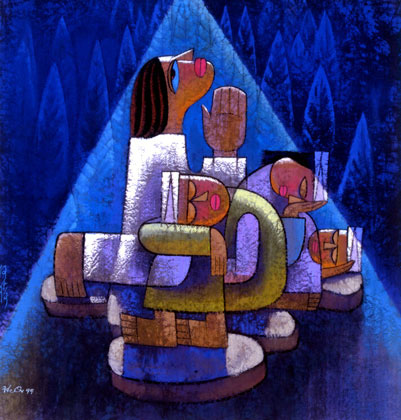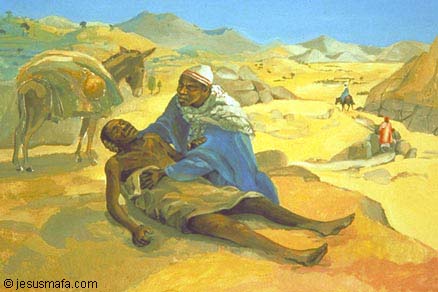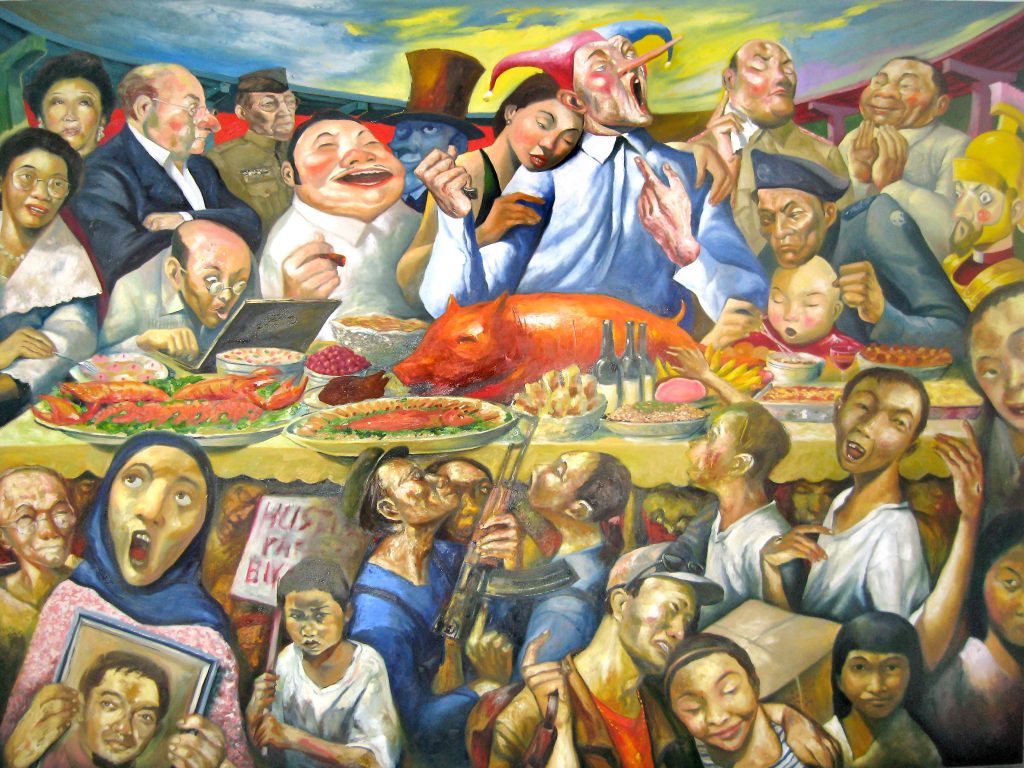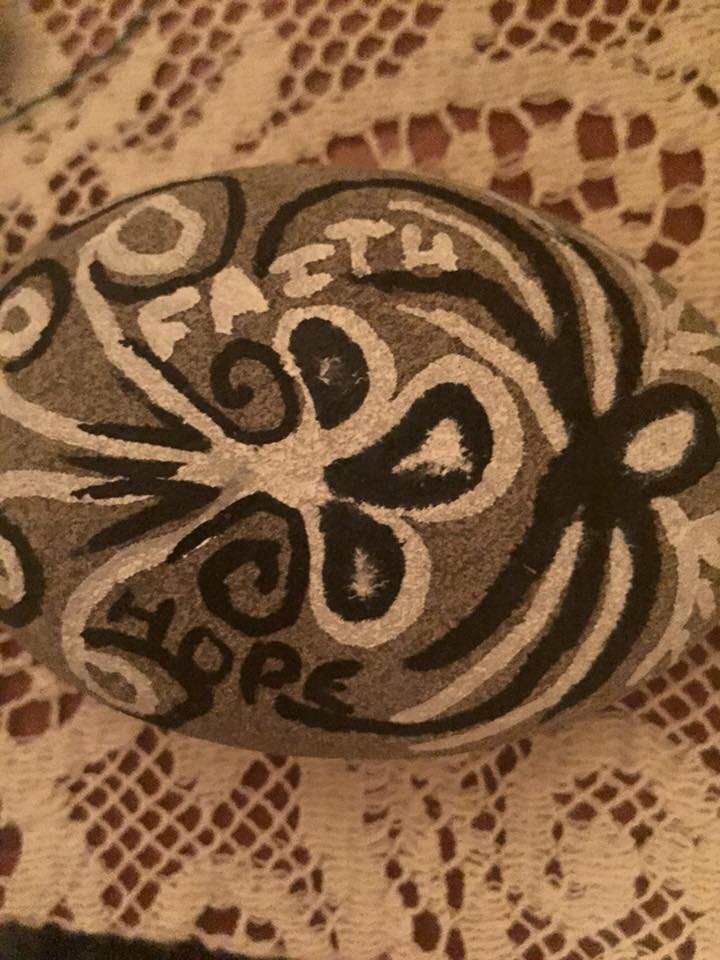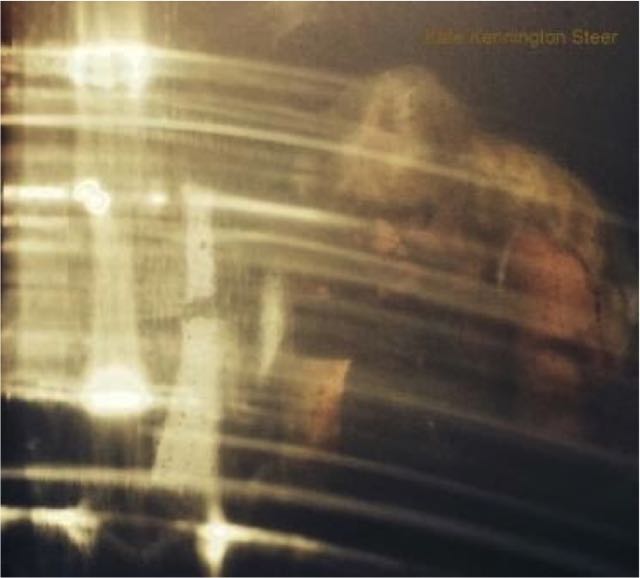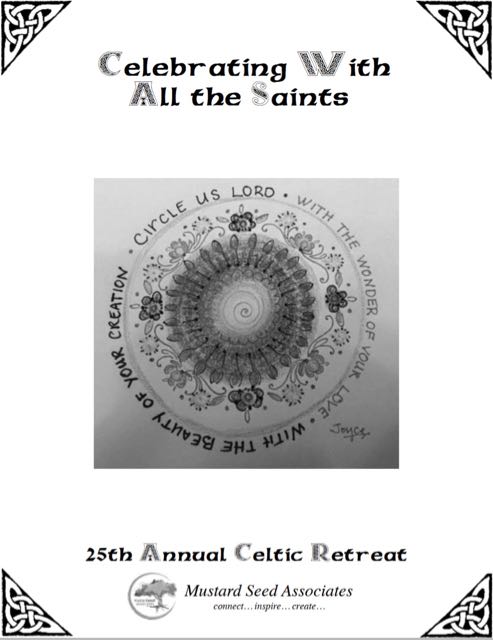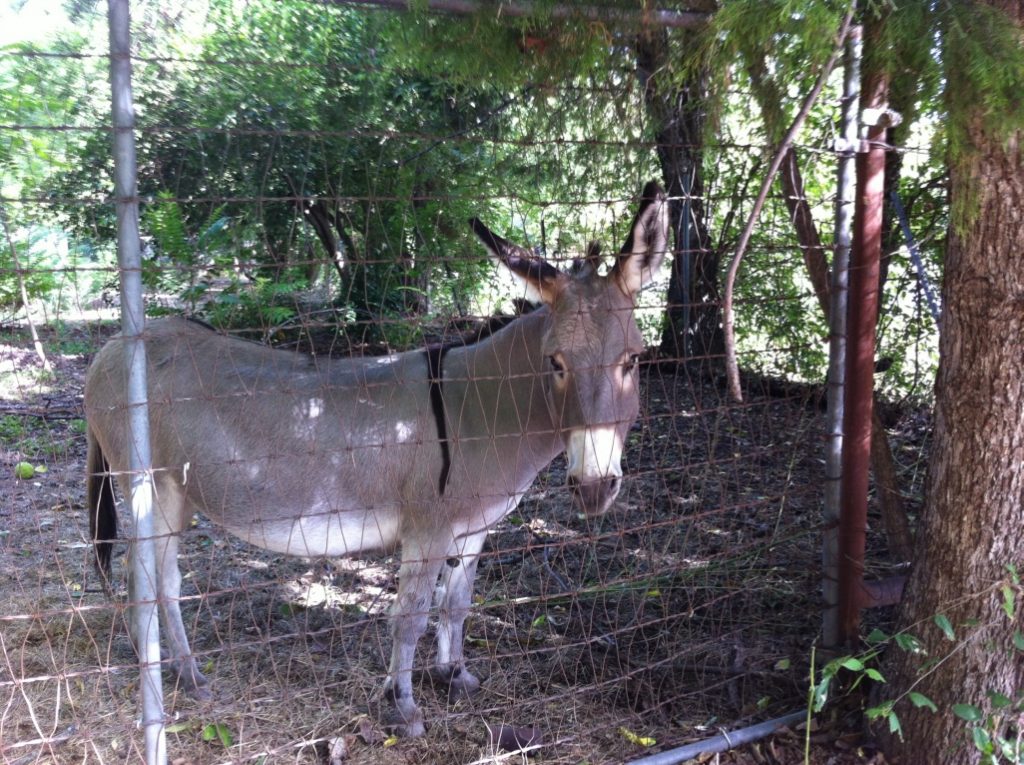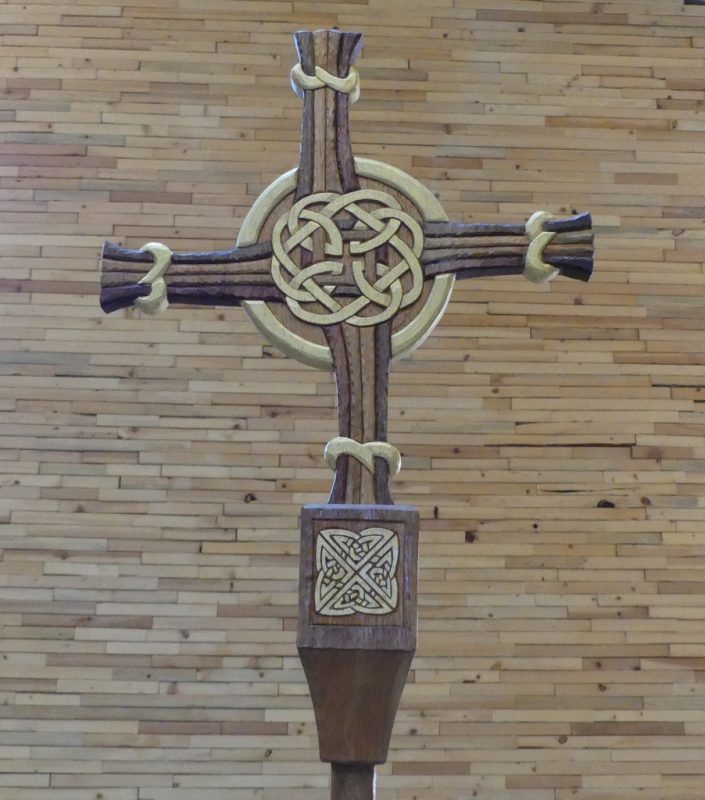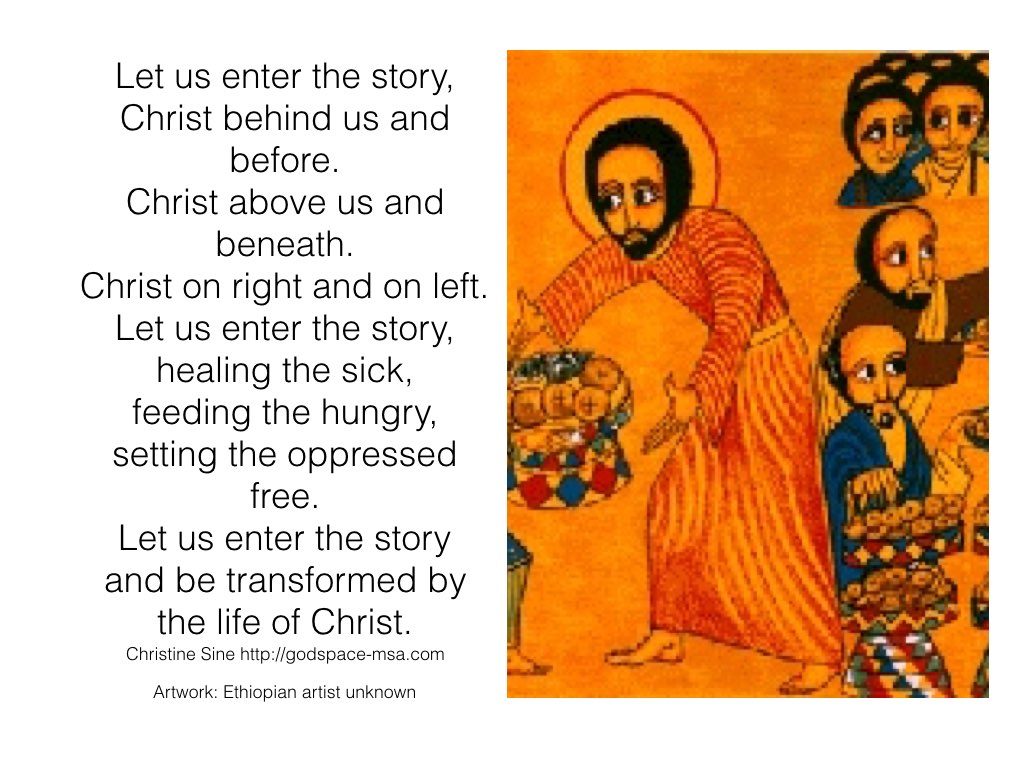 by Christine Sine.
by Christine Sine.
August on Godspace is a month for learning from the life of Jesus. Isn’t that what Christianity is all about you may ask? Well yes and no. Sometimes it seems we skip straight from Jesus’ birth to his death. His amazing life story of healings, liberation and generosity are often ignored. Birth and death are easier to focus on because we have no control over the outcome. Reading about the life of Jesus means taking a stand and making a commitment to a transformed way of life.
So what does the life of Jesus teach me?
1. Learning to Rethink the Biblical Story
Jesus turned the Israelite’s view of God and God’s story upside down. He showed them that God is not into judgment and criticism but rather love and forgiveness. Jesus helps us to see that our views of God are distorted by empire builders and power grabbers that lauded wealth and control over freedom and equality. It’s amazing how easily we buy into their story.
Rethinking the Biblical story has convinced me that at the center of human history is a God who cares deeply not just for “the chosen people” but also for prodigal sons, prostitutes, refugees and gentiles to name just few. God wants to overturn injustice, dispel oppression and heal disease. God is doing everything possible to restore all of creation to the wholeness of the original creation.
My rethinking of the Biblical story continues to be shaped by some radical theologians – like Ched Myers whose understanding of the Parable of the Talents – A View From the Other Side rocked my boat a few years ago. And Australian theologian Mark Brett whose contention that God’s intent for human freedom, equality and prosperity has been twisted through faulty interpretation into a mandate for the strong to subjugate the weak is a challenge to all of us.
Question: When was the last time your read theology that took you outside your comfort zone? What are the places in which God still wants to turn our understanding of the Biblical story upside down?
2. Learning to do as well as talk.
I hate armchair Christians and Jesus life story constantly encourages me not to become one. Jesus didn’t just talk about all the right things to do, he did them. I meet a lot of armchair activists at church, people who know about all the right things, encourage others to do them but never get involved themselves. James asks us:
What good is it, dear brothers and sisters, if you say you have faith but don’t show it by your actions? Can that kind of faith save anyone? (James 2:14)
This kind of faith does not bring wholeness to others and it does not bring wholeness to ourselves either. Our best theological education occurs not in the classroom but on the streets. We cannot say that we are Christ followers unless we DO as Jesus DID – healing the sick, talking to outcasts, upsetting the economic systems (or whatever the equivalent of knocking over the money tables in the temple is in our society). In the process we will be radically changed.
Question: Where have I settled for words without actions in my faith? How can I become more involved in the radical way of Jesus?
3. Learning to Immerse Ourselves in the Gospel Story.
For the last few years Tom and I have used the daily lectionary readings from the Book of Common prayer as our Bible reading plan. It walks us through the gospels every year. It immerses us in the story and encourages us to do as Jesus did.
Part of what I love about this is the way the daily gospel readings share a story from the life of Jesus and connect it back to the original OT story or principle. For example when Jesus says The poor you will have with you always, his audience immediately knew he was quoting Deuteronomy 18: The poor you will have with you always, therefore be open handed and generous towards them. They knew his words were not an excuse to ignore the poor but rather an admonish to those who were not reaching out to help.
How often do we misunderstand what Jesus means or find excuses not to respond because we don’t know the connections? Jesus’ childhood education would have immersed him in the Torah. He knew what the scriptures said and was therefore less vulnerable to the attacks of the devil in the desert and to the attacks of the Pharisees and Sadducees in society.
Question: When do I become vulnerable to spiritual attacks and criticism because my life is not immersed in the gospel story?
4. Learning to Party the Story.
N.T. Wright says “everywhere that Jesus went there was a party.” Jesus loved to enjoy life and helped others to enjoy life too. He turned water into wine at a wedding. He multiplied fish and loaves to feed thousands. He made breakfast on the beach of his friends. I can’t imagine that any of these were somber occasions.
When I was on the mercy ship Anastasis, we held a celebration in each port called a “highways and byways feast.” As with the story of the banquet feast in Luke 14 where the host sent out servants into the streets and country lanes, crew members would go out into the neighbourhood and invite people back for dinner. It was one of my favourite celebrations, bringing the joy of food and fellowship to many who were rarely invited into a home. Often the meal forged lasting friendships with people at the margins.
More recently I learnt about a church in Southern California that held a Pentecost Chili Cookout where they invited neighbourhood people into the celebration and into the gospel story in a fresh way.
Meals change people. Fellowship round the dining room table is probably the most effective form of discipleship and evangelism there is.
Question: What is one idea you have for a party that revolves around a story form the life of Jesus? How could you use this to both concretize your own faith and invite others into your faith journey?
5. Learning to Write Your Own Story.
Experimenting with creative ways to express my faith convinced me that the ongoing creativity of God can be lived out in our lives and our faith. I come alive and my faith is strengthened as I paint rocks, plant gardens, write prayers and draw close to God in the process.
Don’t get stuck in the ruts of stale spiritual practices and rituals. Jesus played with mud, drew in the dirt, talked to outcasts, held children on his lap, all outside the Jewish understanding of spiritual practices. Such innovation helps us rethink our own practices – from how we pray or read scripture and to how we record our journey. We can reinvent the ways we reach out into our neighbourhood and world so they are appropriate for today’s context.
When Tom worked in Haiti, his Haitian friends shared their frustrations with Americans who were always anxious to get to the end of a journey, to reach the destination. For Haitians it was the journey itself that mattered most – they made new friends, they learnt new skills, they shared new experiences and in the process learnt a new story to share with others.
Question: Are your faith practices stuck in a rut? What is one creative new exercise you could learn from the revolutionary practices of Jesus that could transform your faith?
I would like the angels of Heaven to be among us.
I would like an abundance of peace.
I would like full vessels of charity.
I would like rich treasures of mercy.
I would like cheerfulness to preside over all.
I would like Jesus to be present.
I would like the three Marys of illustrious renown to be with us.
I would like the friends of Heaven to be gathered around us from all parts.
I would like myself to be a rent payer to the Lord; that should I suffer distress, that he would bestow a good blessing upon me.
I would like a great lake of beer for the King of Kings.
I would like to be watching Heaven’s family drinking it through all eternity.
(Prayer traditionally attributed to St. Brigit)
During Advent 2014 and Epiphany 2015 I was fortunate enough to be part of a small group of ‘dancing monks’ to take part in a twelve week online class called ‘Birthing the Holy’ at the Abbey of the Arts. The material from this course has now been developed by our Abbess, Christine Valters Painter, into her new book Illuminating the Way: Embracing the Wisdom of Monks and Mystics (Sorin Books, 2016). The course contained enough material in it for me to spend the entirety of 2015 pondering its ramifications, and an equal abundance is now contained in this book through the use of Lectio Divina, meditation, and visual expression in addition to Paintner’s inspired commentary as she explores the life and work of twelve monks and mystics to illustrate particular spiritual archetypes.
Over the last couple of weeks as Godspace has been reflecting on listening to Celtic spirituality, I have come back to my course notes, and Paintner’s chapter on St Brigid (ca. 451-525), the Healer, and I wondered how I might listen to this saint anew.
Brigid the Celtic saint might trace her roots back the ancient Celtic goddess of fire, Brig; her name in some Gaelic forms means’ strength’; the legends surrounding her often relate to her hospitality, reaching out to others in need, forming monastic communities whose purpose was to serve those who were poor and destitute, whose purpose was to bring harmony between the Christian and the Celt. So Brigid becomes ‘the bridge’ between communities. Her Saint’s day is February 1st, the feast of Candlemass, and the Celtic festival of Imbolc, so Brigid becomes the saint of the threshold, the first sign of spring, the healing mother in the birth of light and new lambs. And so Brigid also becomes the saint of the well, of those ancient sacred sites of healing, where pilgrims come to find the gift of refreshment and cleansing.
Brigid has become a symbol of the strong woman for me: certain of her own gifts, certain she is beloved of God, certain she is sent to reach the helpless and show them a way across the divides between rich and poor, between the holy and the unholy, between fires that burn them and water that overwhelms them, between the harm they do others and the pain they inflict on themselves. Brigid encourages wounds to be revealed, that they may be salved.
I find this image deeply compelling: a woman of strength and wisdom being a bridge and a threshold to her own healing, as well as an instrument of transformation in the communities by which she finds herself surrounded. As someone who lives with a chronic illness, the idea of healing is always going to be attractive, but Paintner’s exploration of Brigid as the archetype of the healer encouraged me to dig into what I actually meant when I used the word ‘healing’ to myself. I found myself asking the difficult questions: What are the divisions in me that need healing today? Where are my wounds that still need transforming? What is my calling out into the world today, tomorrow, next month, next year?
It turns out that my divisions are many, and that, as a result, I end up projecting those divisions outwards. I look around me, hear the news, and see them multiplied wherever I look. So I am spending time sitting with my divisions, with the abyss within me where so much unloving towards myself has been stored down the decades, and where a fountain of grief pours forth. It soon becomes apparent that there is a whole troupe of Kates within me whose voice has not been heard, some of them for a very long time. There is a line of Kates queuing up who feel scattered, fragmented, hurt and shamed.
My job now is to offer each of them hospitality, to find out from each of them whether she needs Brigid’s ale or milk, her fire or her water. It will be my lifetime’s work. For what I am learning is that healing is about ‘wholeness’; the act of healing is to help some thing or someone become, be, whole, to assume the form that our God created them to be.
What I am also learning is that the most natural way for me to find that wholeness for myself, and to offer it to others is expressed through the visual arts, in the combination of word and image; in the combination of image and silent space. I need silence to pause and listen to the wounded, divided self my Beloved longs to meet and heal; I need to provide that same pause for everyone I encounter, so that the Spirit can pour into their breaches, so that Wholeness can call unto Wholeness.
So when Painter reminds me that ‘the ancient stories tell us the wound is where the jewels are hidden’ and then asks ‘how might those wounds contain the very medicine you are called to offer to the world?’, I know the legends of Brigid still have much to teach me, if I will but welcome her in.
The 25th Annual Celtic Prayer Retreat August 5-7 is almost here and it is shaping up to be the best ever. This is a perfect time to sign up and join us. The weather will be good, the program excellent and the fellowship exceptional.
There will be wonderful music by Jeff Johnson, presentation on Celtic spirituality by Pat Loughery, liturgies and prayers by Christine Sine and Andy Wade.
For the afternoon there are lots of activities to enjoy – workshops, walking prayer trails (we have 2 new ones) painting rocks, writing prayers, walking the labyrinth or just taking a nap.
And Saturday evening a BBQ, followed by music jam.
Lots to keep you busy but lots of time to relax too.
See – you’re mind is automatically thinking the worse! No, I’m not talking about the “human” kind; I’m referring to the most lovable little gray donkey I’ve ever had the privilege to meet. Okay, so he’s actually the “first” donkey I’ve ever been around, but honestly had no idea an animal like this would ever pull at my heart like he does. Of course Georgie (sweetest little fat Dachshund you could ever know) will always be my constant companion; yet our circle does seem to be widening to include this “larger” specimen he’s yet to figure out!
We came across him quite by accident actually. On one of our morning walks around the neighborhood, we passed a tree-lined stretch of fence that was at the back of one of the larger homes in the area. Who would have expected to see a donkey living in the middle of town?? Guess that’s why the surprise was so genuine!
Life can do that to you sometimes though; throwing a curve that can snap you to attention. Very often that jolt is unpleasant ..like a “consequence” for something left undone; feeling a loss or guilt for living a life full of distractions. I’m just so thankful that this time it was one of those child-like moments when you know you’ve found a treasure! It felt like I came across someone I used to know ..someone whom I’ve missed ..someone who was just as glad to see me as I was to see him!
Now I have to tell you ..I’m not the ONLY one who knows about this donkey. I found this out when I gleefully posted on Facebook about my discovery and mentioned that I was going to name him Jack. A couple of my previous co-workers replied that they knew all about him – and that his name was something like Robert or Stephen(?). Tricksters as they are (and have always been) I smelled a rat and decided to keep calling him Jack. But then, a good friend (who was actually vacationing in France at the time) saw the post and replied that she, too, knew about this donkey and his owner …and his name! And his name is Charlie.
Charlie. That was my father’s name. My father who died just eleven weeks after my 18th birthday. The man I never really got to know. I don’t think any person knows their parents as “people” until they are adults themselves. OH GOSH!! I’m not trying to compare Charlie ..with Charlie!! But what I am trying to say is that there IS a spirit that wafts through this world that has a story to tell us …if we’ll just pay attention.
I never got to hear my daddy’s stories; but let me tell you one of Charlie the “donkey’s” stories. His story is about having patience …as strangers and small chubby dog run up to his fence; about being calm – not over-reacting …when eager hands reach through the wire to scratch his nose and ears; about taking simple strides and slow breaths …when approaching things that are uncertain (what are these strangers up to?); about staying in the moment and enjoying the simplicity of life …like licking the hands of new friends, and nibbling the gift of a carrot or sugar cube.
Might this be daddy’s story too – the one he never got to tell me? To meet life with a sense of patience and calm. Don’t over-react when new things come your way; approach each opportunity with slow, steady steps. Take a deep breath in dealing with the people and circumstances as they show up; appreciate them for what they are right now – messengers and teachers. Don’t try to rush into the future, because it doesn’t exist yet. Stay in the moment. Enjoy each precious encounter as it saunters and brays up to the boundaries of your life. This simplicity will be your joy.
Yes, I think that’s exactly what daddy would have said. Perhaps I wasn’t ready to hear it until now. And to think …I saw all this in the soft charcoal eyes of a little gray donkey named Charlie.
by Paul Neeley
Saint Brigid of Kildare or Brigid of Ireland (Irish: Naomh Bríd; c. 451–525) is one of Ireland’s patron saints, along with Patrick and Columba. Irish hagiography makes her an early Irish Christian nun, abbess, and founder of several monasteries of nuns, including that of Kildare in Ireland.
Here are 3 contemporary responses to St. Brigid – a prayer, a cross (above), and a poem – all responses to listening across the centuries to the life of the Celtic Saint, Brigid.
I appreciate this prayer to St. Brigid, apparently from Renmore Parish in Galway, Ireland. It’s so relevant for the world today.
Prayer to Saint Brigid
Saint Brigid.
You were a woman of peace.
You brought harmony where there was conflict.
You brought light to the darkness.
You brought hope to the downcast.
May the mantle of your peace cover those who are troubled and anxious, and may peace be firmly rooted in our hearts and in our world.
Inspire us to act justly and to reverence all God has made.
Brigid you were a voice for the wounded and the weary.
Strengthen what is weak within us.
Calm us into a quietness that heals and listens.
May we grow each day into greater wholeness in mind, body and spirit.
Amen.
St Brigid’s Cross
The cross above is based on the traditional St Brigit’s cross made of rushes.
Tradition has it that when a pagan chieftain from the neighbourhood of Kildare was dying, Christians in his household sent for Brigit to talk to him about Christ. When she arrived, the chieftain was raving. As it was impossible to instruct this delirious man, hopes for his conversion seemed doubtful. Brigid sat down at his bedside and began consoling him. As was customary, the dirt floor was strewn with rushes both for warmth and cleanliness. Brigid stooped down and started to weave them into a cross, fastening the points together. The sick man asked what she was doing. She began to explain the cross, and as she talked, his delirium quieted and he questioned her with growing interest. Through her weaving, he converted and was baptized at the point of death. Since then, the cross of rushes, known as St Brigid’s cross has existed in Ireland.
A Poem in Honor of St Brigid
Here’s a poem in honor of St. Brigid written by ‘Brigid Claire Oak’ which I found through the Facebook group ‘Celtic Christian Tradition.’ She has given permission to share it here: She notes, “The words came with a little melody and I do sing it, but it is not set to music in an official sense.”
Her habit is
a dancing dress,
her prayer beads, tinkling bells.
She settles in
the sun’s caress,
and drinks from ancient wells.
Her abbey is
a grove of oak,
deep in a forest glen.
From here the Winds
of Wisdom spoke,
from here She’ll speak again.
Her bread’s a hearty
cake of oat,
Her wine’s a honey meade.
She gives away
her shoes and coat,
the hungry she does feed.
Her altar is
a peasant’s heart,
draped in Love’s linen, fair.
The Queen of Heaven,
Prince of Peace,
and angels meet her there.
Her mantle is
the meadow green,
all creatures are her friends.
Those once forgotten,
now are seen,
their brokenness she mends.
Her sacred well’s
a lake of ale,
with roses all around.
Her faith, a currach
setting sail,
her soul is Holy Ground.
Her crozier is
a wand of light,
her mitre; made of fire.
The Shepherdess of good
and right,
compassion and desire.
Her smile’s a message
of God’s care,
and Love that knows no end.
Dear Anamchara of Kildare,
Saint, Abbess,
and Soul-Friend.
May we all continue to listen to the life of St. Brigid, and follow her steps as she followed the steps of Christ.
A Familiar Stranger
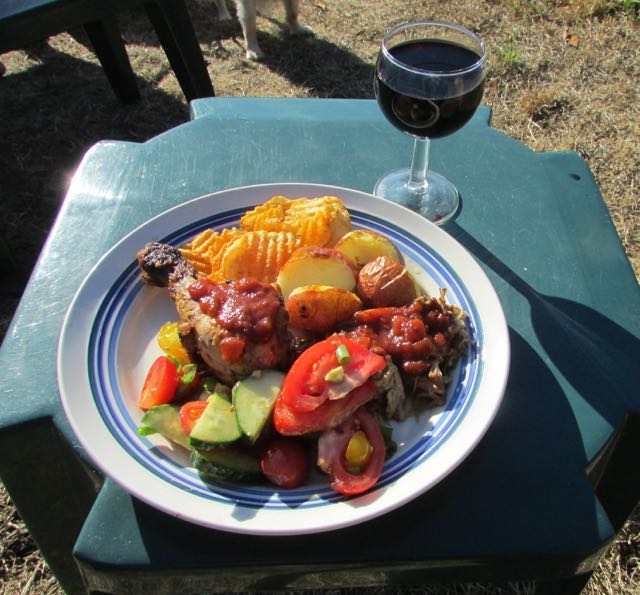 I saw a stranger today.
I saw a stranger today.
I put food for him
in the eating-place
And drink
in the drinking-place
And music
in the listening-place.
In the Holy name
of the Trinity
He blessed myself
and my family.
And the lark said in her warble
Often, often, often
Goes Christ
in the stranger’s guise.
O, oft and oft and oft,
Goes Christ
in the stranger’s guise.
— The Celtic Rune of Hospitality
Send to Me, Lord, a Familiar Stranger
In today’s day, we’re apt to miss many an opportunity to deliver hospitality to the Christ woman and man in our midst, purely because the Day has cast a spirit of fear over us, in the legitimate name of safety and security, because of terrorism.
But the Day is eternal and we have the Presence of the Holy Spirit in us to discern the Familiar Stranger from the would-be extremist. The Familiar Stranger deserves our favour, for she or he will bless us by us being a blessing to them, and she or he will double that blessing.
For the law of reciprocity has its vision in burgeoning kindnesses bestowed without thought for return.
So ask the Lord, today…
Bless me a stranger, Lord.
Proffer before me, in my midst,
the presence of Your Presence,
in the frame of the Familiar Stranger.
Make them to come into my mind,
as Your sweet Presence blows them into my conscious reckoning,
as we both imagine, You and I, what might become.
Cast them bodily into the light of my day,
and make them to be Your messenger,
by some bizarre God-incidence.
Cause them to be blessed as I am blessed,
seeing in us, You as You in us unite,
as we both partake of a gift that can only come from You.
Make me to see as they leave my sight,
as they skip a merry tune,
the vision of that resonating truth in the lark’s warble.
And make me also to be blessed of You — Father, Son and Spirit — GOD, three-in-one — so I may do the same in the morrow, ever more. AMEN.
© 2016 Steve Wickham.
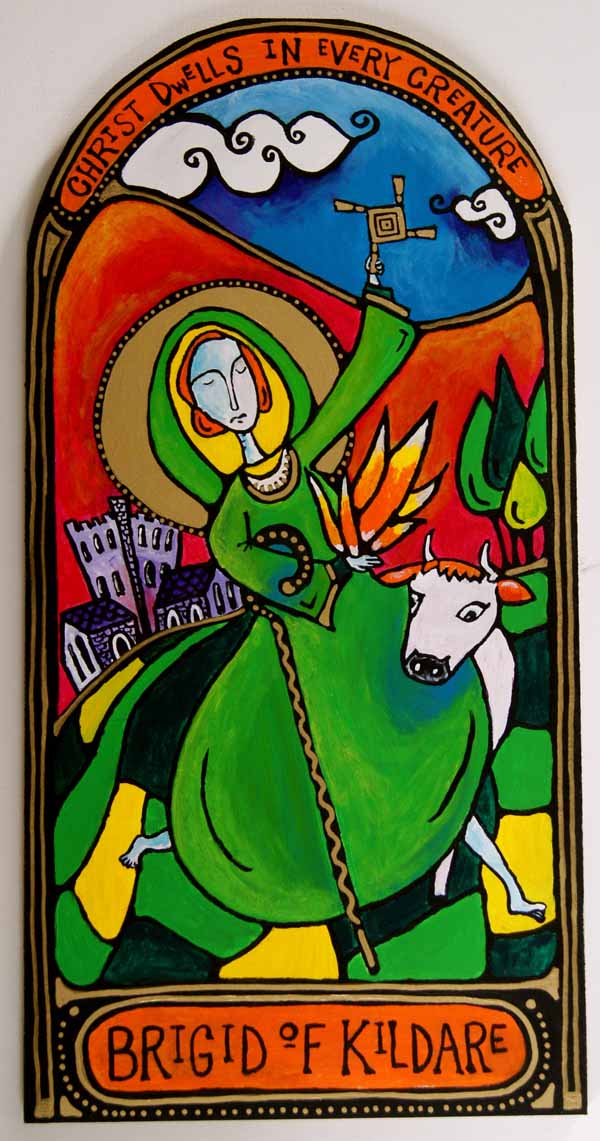
Brigid of Kildaire by Marcy Hall. Rabbit Room Arts. Used with permission.
by Christine Valters Paintner
In Ireland, Brigid is one of the three patron Saints of the land alongside Patrick and Columba. We don’t know many details of her life, and there is great evidence that she is part of a much older lineage extending back to the Irish triple goddess Brigid of pre-Christian times who was the goddess of poets, smithwork, and healing.
Most of what we know about St. Brigid comes from the Life of Brigid written by the monk Cogitosis in the second half of the 7th century. The Life emphasizes her healing, her kinship with animals, her profound sense of hospitality and generosity, and concern for those oppressed.
On the eve of January 31st , which is the night before her feast day, it is traditional to leave a piece of cloth or ribbon outside the house. It was believed that St Brigid’s spirit traveled across the land and left her curative powers in the brat Bride (Brigid’s Mantle or cloth). It was then used throughout the year as a healing from sickness and protection from harm.
Brigid was a powerful leader and one of the founders of monasticism in Ireland. She was an abbess, healer, soul friend, prophet, and more. Many miracles are connected to her, especially related to milk. She had a white cow who could give as much milk as needed. A small amount of her butter miraculously feeds many guests. There is a sense of lavish hospitality and generosity connected to the spirit of Brigid. Many of the stories connected to her, reflect the dignity of the ordinary tasks, especially in the home. No more divisions between what is worthy of grace and beyond the scope.
Often in Ireland, I have heard Brigid described as a bridge between the pre-Christian and Christian traditions, between the other world and this one. The Healer is the one who bridges gaps and divisions. She can help bring healing to a world divided between religious beliefs. She bridges the natural and human world. Brigid sees the face of Christ in all persons and creatures, and overcomes the division between rich and poor. One of her symbols is her cloak which becomes a symbol of unity. All can dwell under her mantle.
Archetype of the Healer
The Healer is the one who helps us to overcome inner divisions of body, mind, soul, heart, and spirit. Healing is very different than curing. We might have an illness which does not alleviate, but the Healer within allows us to find some wisdom and grace in the experience, allows us to have some peace and ease in the midst of unknowing and pain.
Similarly, with emotional wounds, the Healer is the one who helps us to welcome in the stranger and find reconciliation and perhaps even gratitude for these parts of self that have for so long vexed us.
Healing is not so much about “doing” but about a way of “being” that lies beyond all the false divisions we make in our lives. Healing often inspires radical life changes, and brings about ways of being more in alignment with our True Self and nature.
The Healer is not only present in the traditional practice of medicine, or other healing arts such as herbalism, massage, energy work, midwifery, and so forth. The Healer also works through spiritual direction, retreat work, psychotherapy, and any ways that a person accesses this archetypal aspect of self to foster an overcoming of divisions.
We each carry the great wounds of life, but some of us will become victimized by them and let them ultimately tear us apart. While some of us will slowly find empowerment and a call to be in service to others. We may resist our wounds, but the ancient stories tell us the wound is where the jewels are hidden. Wounding can become a process of initiation into a way of being which honors the wounds of human life and approaches with reverence and gentleness, creates spaces where the wounds are made welcome.
Brigid reminds us that ultimately we must turn within, and find the inner Healer at work, call upon her or his wisdom for us. It can be confusing when we are ill and there are so many possible modalities for healing. When we pause and turn to the Healer we have inside of us, we can ask for the way forward. This doesn’t mean that we don’t seek the healing gifts of others, but that we don’t give away our power to heal in that relationship.
Excerpted and adapted from Illuminating the Way: Embracing the Wisdom of Monks and Mystics (Ave Maria Press) by Christine Valters Paintner.
 Christine Valters Paintner, PhD, REACE is the founder and online Abbess of AbbeyoftheArts.com, a global monastery offering resources for contemplative practice and creative expression. She is the author of nine books on spirituality and the arts, including her most recent Illuminating the Way: Embracing the Wisdom of Monks and Mystics. Christine and her husband John live on the wild edges of western Ireland where they lead slow, soulful pilgrimage experiences.
Christine Valters Paintner, PhD, REACE is the founder and online Abbess of AbbeyoftheArts.com, a global monastery offering resources for contemplative practice and creative expression. She is the author of nine books on spirituality and the arts, including her most recent Illuminating the Way: Embracing the Wisdom of Monks and Mystics. Christine and her husband John live on the wild edges of western Ireland where they lead slow, soulful pilgrimage experiences.
As an Amazon Associate, I receive a small amount for purchases made through appropriate links.
Thank you for supporting Godspace in this way.
When referencing or quoting Godspace Light, please be sure to include the Author (Christine Sine unless otherwise noted), the Title of the article or resource, the Source link where appropriate, and ©Godspacelight.com. Thank you!

